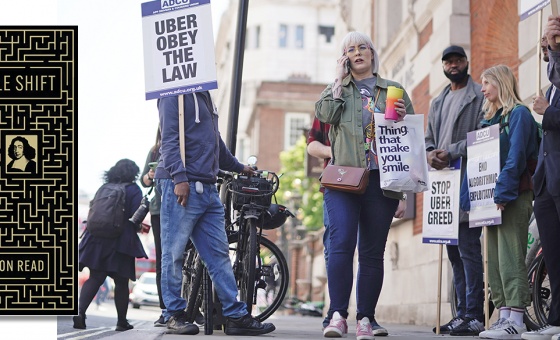This is the last article you can read this month
You can read more article this month
You can read more articles this month
Sorry your limit is up for this month
Reset on:
Please help support the Morning Star by subscribing here
Richard House [RH]: Alan, I remember in the 1970s how Keith Joseph quite deliberately set out to drag the centre-ground of politics rightwards — and to the great cost of the many, Joseph, Hayek, Thatcher, Reagan and co succeeded. I’m wondering whether Jeremy Corbyn’s great historical counter-legacy could be to drag the centre-ground to where we now realise it belongs — ie in understanding how capitalism is destroying our precious environment and global ecosystem, and how politics must now urgently facilitate a deep, successful caring for our planet. Do you see this as an accurate and useful framing for, and backdrop to, Labour’s forthcoming electoral offer?
Alan Simpson [AS]: Labour’s biggest challenge is the existential threat that stares us in the face. Our economic system is broken. If we’re not careful it will break us all too. Everyone through from Hayek and Thatcher to Johnson and Trump carries some of the blame. What the left must do is write a different economics of tomorrow. Taxing the richest and redistributing wealth is no longer enough. Chasing “growth” economics will only accelerate ecological collapse. Climate physics (as well as Extinction Rebellion and Schools Climate Protesters) are telling us we have 10 years in which to deliver a complete systems change; the shift into a much more circular economics. My worry is that if this isn’t what Labour offers the electorate, we won’t capture the votes of those who know that rapid and radical transformation is the only choice we have.
RH: That’s a resoundingly clear clarion-call, Alan. Before picking up on the detail of this rich prospectus, an expedient question immediately arises. Within the realpolitik of our electoral system, can a policy offer of this nature be framed in such a way as to convince sufficient a number of voters to get Labour into power under first-past-the-post? — especially when complacent, pro-capitalist Tories and their friendly media will no doubt do all they can to distract voters from the brute realities of possible collapse.
AS: Most people are well aware of how close we are to these “brute realities of possible collapse.” Even the Governor of the Bank of England openly warns that “firms ignoring the climate crisis will go bankrupt.” I’m certain that if Labour offers the alternative, the public will deliver the mandate. The key is to make sure that, at every level, people feel they are at the heart of this “rescue mission.” This plays to the Corbyn/McDonnell commitments to radical democratisation and decentralisation as well as to the delivery of a decarbonised economy. If Labour offers people warm homes, restored (clean and cheap) public transport and local clean-energy systems (that cut bills in half)…and tons of jobs, this is what the public will vote for.
RH: I’m greatly inspired just reading this, Alan! With reference to “people feeling they are at the heart of this ‘rescue mission’,” do you see any possible role for Extinction Rebellion’s proposal that People’s Assemblies should be held in order to help government formulate and deliver a suite of climate-crisis policies that are, in a sense, “owned” by ordinary people, rather than simply being imposed by remote experts or technocrats from “on high?” Could such a genuinely “inclusivist,” empowering offer be built into Labour’s manifesto in order to radically democratise society’s response to the crisis?
AS: People’s Assemblies are the key to everything, and I really hope Labour grasps this. The scale of change needed involves wartime mobilisation for peacetime security. You can’t do this without taking people with you. Over 200 local councils have passed Climate Emergency resolutions. But most don’t know what to do next. There is no magic formula to this, but involving local people in the “how” of radical change is absolutely essential.
But it also needs leadership. The gilets jaunes protests in France showed how not to do it. In contrast, on the day congestion charging began in London, Ken Livingstone put 300 new buses and services on the streets. People loved it. Nottingham’s car parking levy pays for the new tram-line services (with trams built in Derby). People love these too. In Paris, near-empty car parks are being turned into mushroom farms supplying produce to local shops. “Share the power” has to be Labour’s message. National leadership and local empowerment must go hand in hand. That way, communities can shape the gain instead of the pain.
RH: “Share the power” — what a great message for Labour to take to the country. And “Sharing the power — for the many, not the few” perhaps sounds even better. This has to be the future; and if handled well, it will surely mark a major deepening and maturing of our whole democratic system — and one that I imagine the Establishment certainly won’t be welcoming.
But just to return to your earlier answer, Alan: I’m struck by your evocative phrase “a different economics of tomorrow,” and that “chasing ‘growth’ economics will only accelerate ecological collapse.” Yet as I understand it, Labour is still signed up to growth economics (certainly in its 2017 manifesto). I think we’re culturally, systemically and psychologically addicted to growth; and as Marx showed, the internal dynamics of capitalism demand and necessitate growth (aka capital accumulation). How close do you think Labour is to really embracing this one, and questioning our collective addiction to growth at a policy level?
AS: Our collective addiction to “growth” is a massive problem. Marx was right. Capitalism feeds off acquisitive consumption and unequal distribution. Chasing more “stuff” is part of the problem, not the answer. Keynes understood this too, arguing more for an economics of inclusion rather than of expansion. Labour should follow New Zealand; making “wellbeing” rather than “growth” the touchstone of our public offer. Then we have to spell it out.
Insulating 30 million buildings by 2030 would be a good start. It would show how to create jobs, deliver skills, reduce energy consumption and end fuel poverty. Follow this with (clean) public transport systems, active travel, local food networks and massive environmental repairs. Then, suddenly you discover this is tomorrow’s inclusive, low-carbon economics; the only one that might avoid climate breakdown. But you’re right. We’ll never get there without breaking the growth addiction.
RH: I see raising the general level of awareness as crucial, Alan. Perhaps Labour-in-government could advocate and enable a series of ongoing local conversations across the country about these issues, via both workplaces and voluntary organisations (on themes like growth, consumerism, sustainable lifestyles, addiction psychology, etc), as a complement to People’s Assemblies.
Finally, could you say something more about what you mean by “circular economics,” and how you think Labour can best frame a compelling case that citizens will connect with and vote for, regarding the “economics of tomorrow” that we so desperately need.
AS: I have a different take on this. The climate movement is well ahead of Labour in addressing the crisis we face. If we want their votes, our task is to convince enough people that a Labour government wouldn’t slip back into the language of “expanding world trade,” “growing the economy,” and de facto propping up today’s pollution. Large numbers of those drawn to Labour’s 2017 vision of a better society already question whether we really grasp the urgency of change.
To do so we will have to end all fossil-fuel subsidies (shifting them into renewables and energy efficiency programmes), remove VAT from repairs (and put a carbon tax on imported goods), make airports live within reducing annual carbon budgets, shift roads programme funding across to rail and public transport, and bring in Norwegian-style plastics taxes (with a national deposit/return scheme to match their 95 per cent recycling rate). This is how the circular economy works. Others are racing into it. Labour’s job is to convince people that we will, too. In essence, this is what the Corbyn/McDonnell project has always been about. Now we just have to deliver.
Alan Simpson was MP for Nottingham South from 1992 to 2010. Formerly Secretary of the Socialist Campaign Group of MPs, he currently advises Clive Lewis, John McDonnell and Jeremy Corbyn on energy and climate issues.
Richard House is a Corbynista activist and writer in Stroud.











